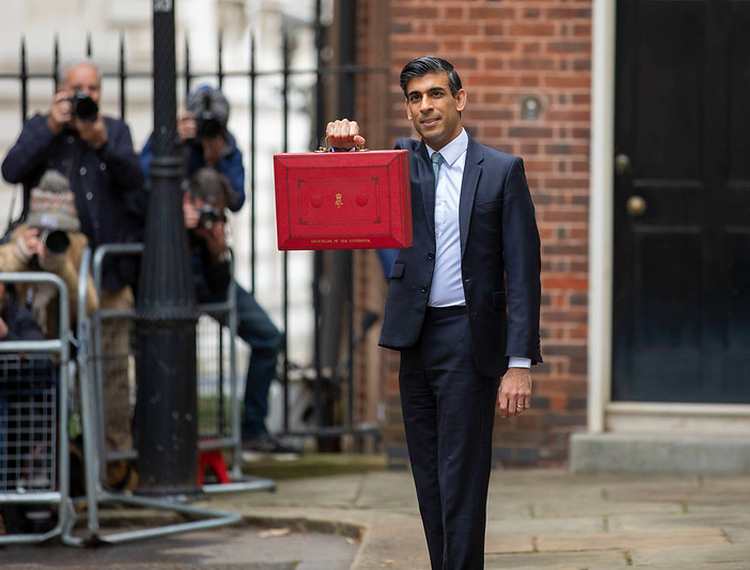Autumn Budget and Spending Review 2021 – Sector Response

The Chancellor @RishiSunak delivered the Autumn #budget and #SpendingReview today (Wednesday 27th October 2021), with a huge focus on levelling up and how the Government wants to level up the country and a new economy post covid, with higher wages and higher skills.
The chancellor shared a few updates on the impact of Covid on the economy. The OBR expected the economy to return to pre-covid levels at the turn of the year. Back in July 2021, the OBR predicted an unemployment peak of potentially 12%, and the OBR has now adjusted this and now predicts a peak of 5.2%, which means 2 Million fewer people out of work as a result. The Chancellor stating that the Plan for Jobs is working.
Delivering the Budget and Spending Review, Rishi Sunak set out a plan to invest in stronger public services, with total departmental spending growing by £150 billion a year in cash terms by 2024-25, a £90 billion real-terms increase, which is the largest real-terms increase in overall departmental spending for any Parliament this century.

Delivering the Budget and Spending Review in Parliament, Chancellor of the Exchequer Rishi Sunak said:
“Today’s Budget delivers a stronger economy for the British people: stronger growth, with the UK economy recovering faster than our major competitors. Stronger public finances, with our national debt finally under control. Stronger employment, with fewer people out of work and more people in work.
“Growth up, jobs up, and debt down: let there be no doubt – our plan is working”.
Additional funding
An additional £630 Million funding was announced to tackle rough sleeping. £150 Million was announced for training and development for the Early Years workforce. An additional £2 Billion in funding was also announced for Education Recovery for education recovery for schools and colleges (to now nearly £5 Billion).
Multiply to increase numeracy and basic maths for adults in the UK
Rishi Sunak also announced a new £560 Million fund called Multiply to increase numeracy and basic maths for adults in the UK. Up to 500,000 people will benefit from Multiply with improved basic numeracy skills through free personal tutoring, digital training, and flexible courses. More than 8 million adults in England have numeracy skills lower than those expected of a 9-year-old with the North East, West Midlands and Yorkshire and the Humber worst affected. And by the age of 30, people with poor numeracy skills are more than twice as likely to be unemployed as their peers.
Additional £4.7 billion will be invested in the core schools budget in England
To support pupils and teachers, an additional £4.7 billion will be invested in the core schools budget in England, over and above the SR19 settlement for schools in 2022-23 – in addition to £1.8 billion of new money for education recovery and catch-up over the next three years.
£6 billion of funding for the Department for Work and Pensions (DWP) over the next three years to help people earn more and gain the right skills
Building on the success of the Plan for Jobs, the Budget and Spending Review will continue supporting people into work with over £6 billion of funding for the Department for Work and Pensions (DWP) over the next three years to help people earn more and gain the right skills.
To boost wages and prospects for all, skills funding will increase by a total over the parliament of £3.8 billion compared to 2019-20. This will quadruple the number of places on Skills Bootcamps, expand the offer on free Level 3 qualifications and launch the new Multiply scheme to improve numeracy skills across the UK for up to 500,000 adults.
To ensure that work pays, the government is increasing the National Living Wage to £9.50 from April 2022, cutting the Universal Credit taper rate from 63p to 55p and increasing Universal Credit work allowances by £500 per year.
Investing in growth:
To spread opportunity across all of the UK, the government is putting its Plan for Growth into action with significant investment in innovation and skills.
To create the high-wage, high-skilled jobs of the future, public R&D investment will increase to record levels of £20 billion by 2024-25. Combined with R&D tax reliefs – which are going to be modernised and refocused – total UK Government R&D support as a proportion of GDP is forecasted to increase from 0.7% in 2018 to 1.1% in 2024-25 – well above the 2018 OECD average of 0.7%.
A new UK Global Talent Network will work with businesses and research institutes to identify and attract the best global talent in key science and tech sectors.
Delivering for all parts of the UK:
The government will make levelling up a reality across Scotland, Wales and Northern Ireland by providing UK-wide support in critical areas, while also targeting action to meet local needs.
Many of today’s announcements will directly benefit people across the UK. This Spending Review also provides an additional £8.7 billion per year to the devolved administrations through the Barnett formula – leading to the highest annual funding settlements since devolution in 1998:
- the Scottish Government will benefit from a £4.6 billion per year funding boost
- the Welsh Government a £2.5 billion per year funding boost
- the Northern Ireland Executive a £1.6 billion per year funding boost
Back on Saturday 23rd Oct the Treasury Team made some teaser announcements of what would be coming in the upcoming budget, the most interesting for FE, Skills and Employability was the announcement around: The Skills Revolution being set to continue with £3 Billion boost set to be announced in the budget. Which isn’t an insignificant amount of funding! With:
- £3 billion investment to build a high wage, high skill economy building on the Prime Minister’s Lifetime Skills Guarantee.
- Life changing opportunities for hundreds of thousands of people to get the skills they want.
- Investment in 16 to 19-year-olds doubled and the number of skills bootcamps quadrupled.
Sector Reaction to the Budget and Spending Review

David Gallagher, Chief Executive Officer at NCFE, said:
“Today’s Budget marks a significant step forward for Further Education.
“The Chancellor’s commitment to invest in a skills-led recovery is very welcome news. We need high quality vocational and technical training options to deliver a stronger and more vibrant economy.
“The Government’s pledge to boost T Levels as a flagship vocational alternative to A Levels is particularly encouraging and the investment in skills bootcamps is another step in the right direction. But as with any new programme, we must build on the evidence of what works and can work in our rapidly changing world and labour market, if we are to deliver the best possible outcomes for learners and the economy.
“NCFE has long been calling for a re-balancing of the curriculum so that people are empowered and equipped to make the best possible choices about their futures. We will support the Government in creating more opportunities for individuals to thrive through world-class technical skills provision.”

Rae Tooth, chief executive of Villiers Park Education Trust said:
“The Chancellor is still playing catch-up on levelling up. Today’s long-awaited statement offers some encouragement about how this government intends to tackle education inequality, but it does not go far enough and as always the devil will be in the detail.
“The Chancellor was right to say that a good education was the birth right of every child, and we welcome the news that the Holiday Activities & Food Programme will continue. The government’s commitment to increase places for young people with special educational needs is also to be welcomed.
“But if this government is serious about levelling up life chances then it must act with urgency to close the educational attainment gap. The news that per pupil funding for schools in England will return to 2010 levels in real terms is welcome, but it is young people who have borne the brunt of those cuts over the last decade. And today’s increase in the education recovery fund, bringing the total amount up to £5bn still falls far short of what the former catch-up tsar Sir Kevan Collins called for.”

Responding to the Chancellor, Rishi Sunak’s announcement in the Autumn Budget to provide £800 million for education recovery, Chief Executive of Association of Colleges, representing over 93% of England’s further education colleges, David Hughes said:
Association of Colleges responds to Autumn Budget and CSR 2021
“It’s clear that the Chancellor and this Government recognise that more investment in skills is vital for economic growth and their levelling up ambitions. So it is disappointing that despite lots of warm words about the importance of skills, and a long list of separate funding pots, overall investment does not look like it is going up by much at all. A world class skills system needs more investment than this after more than a decade of cuts. Good rhetoric about skills will not level up the country – colleges will do that with the right investment.
“Government’s consistent refusal to increase the funding per student post-16 is baffling. The funding per adult will not have gone up in 14 years by the end of 2024/25, unlike in schools where per pupil funding will match 2010/11 levels in real terms.
“There were some wins for young people and adults which are important to recognise. 16 to19-year-olds were some of the hardest hit by the pandemic and have the least amount of time to get back on track, so the announcement of an education recovery package is to be welcomed. We will now spend time working with DfE on making sure that this is a real, meaningful investment and goes to where it is needed the most.
“Increased access to, and funding for, level 3 qualifications and T Levels can only be a good thing, but not everybody will be able to access them or be ready for that level of study and many will need re-training which is not funded properly. That results in a worrying amount of people falling through the cracks who need better support to be able to get ready to even start a level 3 in the first place. We saw no real support for them today.
‘A stronger economy for the British people’ will ring hollow without addressing the very real challenges still facing the education and skills system. A levelled up country needs levelled up colleges that are adequately supported and invested in to deliver the skills for economic prosperity.”

FAB chief exec Tom Bewick said:
“From the perspective of government wanting to get more money into FE colleges; secure extra capital to deliver on the Department’s own technical education reforms; as well as find additional resource for flagship schemes like Bootcamps, DfE ministers can claim some sort of victory.
“In that sense, l would argue, they’ve found more money to invest in the things that are perhaps more important to them; and not necessarily have they secured the long term investment and policies needed to tackle the great skills and adult education divides that exists in our country.
“Indeed, what this Budget and spending review absolutely doesn’t do is fully reverse over a decade of austerity in FE. England’s investment in technical education per head will still fall well below that of our major competitors; and crucially, today’s Budget fails to tackle the huge intergenerational divide, since the burden of higher taxes and the cost of living squeeze will continue to fall disproportionately on the young, renters and those in work on average earnings.”

Kirstie Donnelly MBE, CEO of City & Guilds Group commented:
“Whilst we welcome the Chancellor’s spending package for professional and technical education, we need more clarity over whether the Chancellor’s commitments to the sector are new, or merely a rehash of funding that was already allocated and sold to us as something ‘new’. With a million jobs left unfilled (along with our supermarket shelves and petrol tanks) there is too much at stake to get this wrong.”
“Undoubtedly, some solid foundations have been put into place in terms of T Levels and Apprenticeships, but make no mistake there is still significant work to be done. For starters, if T Levels are to succeed they will need young people to choose to study them. This will require a significant amount of support from Government over the next few years to promote them to young people, their parents and teachers alike, and convince them of the life changing benefits they could bring.
“Additionally, we still don’t have a skills system set up to meet the needs of adults who will need to constantly upskill and reskill over five-decade careers. The Chancellor may have pledged investment in bricks and mortar colleges, but in a world that’s becoming increasingly digital, as we proposed in our Spending Review submission, we need to act now to introduce more short-term flexible and modular solutions such as our Skills Bridges to help fill key roles and ensure that people of all ages and at all stages of their careers are able to upskill and reskill.
“What we’re still not seeing is a comprehensive long-term strategy, that connects the dots of careers advice, pre and post 16 education and employment to local labour market needs and creates longer term growth and productivity.”

Stephen Evans, chief executive of Learning and Work Institute, an independent think tank dedicated to lifelong learning, full employment and inclusion, said:
“It’s good to see investment in skills rising again after a lost decade of cuts. However, it looks like this only restores some of the previous cuts and so won’t be enough to transform Britain into a skills superpower. We need more detail on both levels of investment and how money will be spent.
“The large cut to the Universal Credit taper rate and rise in the minimum wage are hugely welcome and will help low income households. But there’s more to do on the on the cost of living and supporting people to move into work to tackle the 900,000 shortfall in workers we’ve identified; the Plan for Jobs is working but there’s so much more to do.”
The skills trade body ‘The Association of Employment and Learning Providers’ has responded to the Autumn Budget and Spending Review 2021 with cautious optimism. The government’s focus around the skills agenda has been appreciated. We certainly welcome any investment which will help reach ambitions to get people into good quality, well-paid sustainable work.
AELP welcome further funding for traineeships and four-fold investment in bootcamps. Both offer a great blend of skills and employability. However, we must not lose sight of the 9 million adults who lack basic functional skills. The new Multiply programme for adult numeracy should help to address this, however we equally need investment in numeracy and support in place for those who lack basic digital skills.
AELP also welcome investment in the level 3 adult offer. However, “levelling up” will be nothing more than hollow rhetoric without proper investment in level 2 and below skills provision. For many learners and across many industries, level 2 and below qualifications are the first rung on the ladder of opportunity.

Jane Hickie, Chief Executive of AELP said
“The Chancellor has used the Autumn Budget and Spending Review as an opportunity to substantially invest in skills. This is welcome and necessary, if we are to have any hope of building back better following the pandemic. I particularly welcome investment in apprenticeships, traineeships and employability programmes. This focus on vocational learning will help get people of all ages and at every level into good quality training and work. However, it is clear there remains a real lack of parity in treatment of different FE provider types. Independent training providers have been left out of education catch- up funding and capital investment, both of which are only available to schools and colleges. This is disappointing, given the important role independent training providers play in supporting employers and learners”.

Alice Barnard, Chief Executive of Edge Foundation said:
“This Spending Review saw much rhetoric around “world class public services” and investing in a “high wage, high skilled economy”. While we’re pleased to see the Government’s increased funding commitment to education at the Spending Review, there are gaps that must be addressed. Firstly, while £3.8 billion for a skills revolution is welcome, we also need to see more support for Level 2. Secondly, while a £2.7 billion increase for apprenticeships is needed, this must be more carefully targeted towards 16-24 year olds and pre-apprenticeship programmes. And finally, while support for T-levels is welcome – we cannot simply create a binary system that forces learners to choose between academic and vocational. Instead, let’s #protectstudentchoice by safeguarding valued standalone vocational qualifications. We need to see a bolder long term vision that turns rhetoric into tangible action.”

Patrick McGrath, Head of Education Strategy at The Texthelp Group comments on T-Levels:
“The Government has announced today a further £1.6bn over three years to roll out new T-levels for 16 to 19-year-olds and £550m for adult skills in England. Further education has been an often overlooked sector for funding and specialist support – it has undergone many reviews, and has never had the focus, attention and funding it deserves or needs.
This funding is very welcome, and a significant start to revamping and re-energising the sector. The overhaul to T-levels and move from BTEC makes huge sense in the world we now live in – giving a mix of skills and experience focus, and as a qualification I’m hopeful it will deliver a very holistic set of qualifications.
It’s imperative though that we consider how blended learning will fit into this – if we are to focus on skills for now and the future workforce, digital skills and the ability to learn and develop flexibly must be of paramount consideration. This funding gives the sector the ability to transform qualification standards, and for this particular age group make learning more relevant, attainment more possible and will help retain the direct links from work to learning that colleges have traditionally been fantastic at.”
Patrick continues on SEND Funding:
“The Government is committing £2.6bn to be spent on creating new school places for children with special needs and disabilities. The pandemic has raised awareness around special needs and disabilities (SEND), and this funding will help secure the specialist need for support and education frameworks, to help more than we have ever helped before.
The vast increase in usage of assistive technology suggests the population of SEND students is higher than previously thought. Many have unidentified needs, but with their own individual challenges. This is perhaps the biggest challenge – deciding who gets the support? Just 3.7% of SEND pupils have a ‘plan’ for support.
The recent funding will help with wider access initiatives, such as promoting assistive technology within schools and workplace, and raising awareness and standards for web accessibility.”

Simon Parkinson, CEO of the WEA, the UK’s largest voluntary sector provider of adult education and charity, reacted to today’s Budget speech.
“It is remarkable to hear a Chancellor highlight lifelong learning in a Budget speech and we are pleased that there is a new programme, Multiply, to tackle the long standing challenge of poor numeracy. The Chancellor is right that this impacts personal life and business productivity. Community learning providers have a strong track record in supporting essential skills and we look forward to taking part in the new programme.
“However, maths is only one part of the challenge and the nation also needs to tackle other essential skills such as literacy and digital skills. The Multiply programme will be delivered through the Shared Prosperity Fund so it will be separate to the Department for Education’s (DfE) support of adult learning generally. We look to the detail behind the Budget speech for reassurance that community learning budgets are at least maintained and that the Multiply programme is additional to government spending on essential skills through DfE”

Kevin Courtney, Joint General Secretary of the National Education Union, said:
“Today, the Chancellor Rishi Sunak had a historic opportunity to value education and value educators. Despite his rhetoric he has failed.
“The aspiration of ‘levelling up’ is a good one but Government policy on education is achieving the opposite. As the Public Accounts Committee noted last week, education funding policy is driving money away from areas with greater relative need. Today’s announcement will not remove those inequalities. The Chancellor is also still determined that education recovery will be done on the cheap. This short-sightedness will damage the life chances of young people for many years to come.
“Today’s announcements fall far short of what is needed to tackle the scourge of child poverty. 4.3 million children were growing up trapped in poverty even before the pandemic. Failure to reverse the £20 a week cut to Universal Credit risks plunging yet more children into poverty. Reducing the taper rate will not benefit families without work and will not make up the cut for many working families which do benefit. The failure to expand Free School Meals is a further disappointment. No child should be coming to school too hungry to learn.
“Taking so long to restore the cuts made from 2010 onwards should not be a matter of pride for any Government, but one of embarrassment.
“With just £2bn added, the Government’s plan for education recovery is completely inadequate. Recovery tsar Sir Kevan Collins proposed a £15 billion package and resigned when it was rejected. Even with the announcement today, the Chancellor is operating at around a third of that price. This is simply not good enough. Recovery will take years of work and investment.
“Funding for special educational needs and disability (SEND) has consistently failed to keep pace with the growth in numbers of young people with Education Health and Care Plans (EHCPs) in recent years. Today’s £2.6bn additional money will close the gap but only temporarily. It is another example of corner cutting by a Government that is yet to publish the outcomes of its review of SEND provision.
“New funding for post-16 education is an acknowledgement that the sector matters, but only a partial repair of the even greater damage done to this sector than to schools since 2010. Alongside NAHT, we called for an additional £6bn over the next three years. The Chancellor’s skills announcement continues to sideline Applied General Qualifications including BTECs and Cam Techs. This will fall heaviest on disadvantaged students, for whom AGQs have been a passport to higher education and employment.
“Pay has been eroded in real terms by successive Conservative governments, increasing the tide of recently qualified teachers leaving in their first five years. The pay freeze this year was nothing short of an insult, but the hint of a pay rise may still prove to be a con. If the Chancellor expects to meet a pay rise through existing budgets, then we will see further cuts and impossible decisions for school and college leaders attempting to balance their books. The NEU will be watching Rishi Sunak’s next steps carefully – on giving the School Teachers Review Body its head, on taking on board its recommendations, and on funding them fully so that leaders are able to properly reward and retain all their staff.
“We urge the Chancellor to view pay rises as investment. Investment in public services, investment in having the teachers we need in front of our classes, investment in having the nurses we need for our patients. Public sector workers also aid the economy by spending on the high street, something they are less inclined to do if they are struggling to make ends meet. The era of real terms pay cuts – which has seen a 15% cut since 2010, and an alarming exodus of recently qualified teachers – has been wholly destructive and must now end.
“The Chancellor wants to be seen as generous but has inherited a long and sorry legacy of cuts. Offering a fraction of what is needed to repair services which have been persistently underfunded is not valuing education. It is not valuing educators. Schools and colleges need more support to help children succeed. Today, the Chancellor has only underscored his failure to deliver for staff, young people and parents.”
Spending Review: Welcome investment but falls short on recovery, say school leaders

Commenting as the government today set out their spending plans for the next few years, Paul Whiteman, general secretary of school leaders’ union NAHT, said:
“The additional recovery funding announced today is welcome, though it falls far short of the £13-15bn independent experts have said is needed.
“Children and young people have been hugely affected by the pandemic. The government has made bold claims about ‘levelling up’ and ‘no child left behind’. The investment announced today doesn’t meet those goals or the futures needs of the country.
“The increase in per pupil spending announced by the government takes us back to 2010 levels. This is no proud boast, as it represents a failure to invest in children’s futures for over a decade.
“Schools will do their best with what they are given, as they always do. It is important that schools are able to spend recovery money flexibly on the programmes they know work best for the children in most need in their schools.
“Two of the biggest areas of concern for schools are special educational needs funding and children’s mental health. The government urgently needs to publish the findings of their SEND review and commit the money needed to address the SEND crisis in schools. It is unacceptable that two years on from starting the review, the government has still not taken any action.
“Overall, this is a much-needed investment for schools, but it still doesn’t fully recognise that education is an investment in not only our children’s life chances, but in the nation’s future.”

Graham Hasting Evans, Chief Executive of NOCN said:
“I welcome the £1.6bn cash investment for colleges over three years to 2024-25 for T-levels.
“I also welcome the £550m is being invested in adult skills and the further £170m for apprenticeships and training.
“However this a drop in the ocean compared the skill upgrade investment the economy needs for digitisation and Net Zero”.

WorldSkills UK CEO Dr Neil Bentley-Gockmann OBE said:
“The chancellor’s focus on and investment in skills is very welcome. If the UK is serious about levelling up and delivering a high wage, high productivity, high skill economy then we have to act now.
“Along with our partners, WorldSkills UK is already playing its part. Our innovative Centre of Excellence is using international best practice to help drive up standards in colleges and training providers across the UK and level up opportunity for the next generation.
“The chancellor is right to highlight that higher skills will lead to better paid jobs. To unlock people’s potential and lead a skills revolution that increases productivity and drives up wages we also need strategies linking high-quality skills to help secure inward investment.
“Our Skills Taskforce for Global Britain is examining how we match world-class skills supply to help land that much-sought after international investment and create more high-quality jobs in the key growth sectors of the economy of the future, like green tech and advanced manufacturing.”
CBI: BUDGET IS BUSINESS FRIENDLY, BUT WON’T DELIVER HIGH INVESTMENT, HIGH PRODUCTIVITY ECONOMY

Tony Danker, CBI Director-General, said:
“Today, the Chancellor has shown a genuine willingness to listen to business with measures that will get firms innovating and help the economy to grow. It takes several positive steps forward, but isn’t bold enough to deliver the high investment, high productivity economy the Government seeks.
“On Business Rates, the Chancellor made real strides in making the system more palatable for businesses in the shorter term. More frequent valuations, wider reliefs and improving the incentives for firms to decarbonise their premises is what firms have been calling for. But the hard truth is that wholesale reform to unlock investment was rejected today. The Government missed the opportunity to truly reform a business rates system that diminishes Britain’s high streets and factories.
“The Government’s commitment to innovation will be a central cog to the UK’s prospects to leading in the industries of the future. This will be essential to be globally competitive so the Government must stick to these targets in the coming years.
“Meanwhile, businesses will welcome the new skills bootcamps. This agile approach must now be the watchword when it comes to revolutionising the skills landscape, including for apprenticeships.
“This Budget alone won’t seize the moment and transform the UK economy for a post-Brexit post-Covid world. Businesses remain in a high tax, low productivity economy with concerns about inflation. But the Budget will have a positive impact across the economy and makes several changes that will be welcomed by UK businesses.”

Simon Carter, Director at RM comments:
“With Britain’s national debt significantly higher than pre-COVID, and the country’s ageing population weighing heavy on the NHS, it would have been naïve to expect an optimistic Autumn Budget from the Chancellor this year. Instead, it’s safe to say that Rishi Sunak has battened down the hatches and braced the country for a tax-heavy winter – and even Government departments haven’t escaped the cash cull.
“But there is at least some positive news for one of the most cash-strapped Government departments: education. With schools, colleges and universities under enormous pressure to fill staff vacancies, as well as fund ever-developing remote learning offerings, teachers will be relieved to learn that not all areas of education will be facing a further round of cuts this October. And, with half term behind them and shortages of everything from sparkling water to petrol to lorry drivers plaguing Britain in the lead up to Christmas, schools will be reassured that there isn’t another tightening of belts so soon after the pandemic.
“Schools have, after all, become first responders to the families most impacted by COVID. Whether for education, social or mental health purposes, the relationships between students and teachers have meant parents are free to work, and young people free to learn and interact, even in the most difficult of circumstances. While the economy remains in flux in the UK, it’s vital that education institutions remain the priority for the UK Government and teachers’ hard work pays off in time for the next academic year.”

Commenting on funding announced for schools in this year’s Budget, Lee Elliot Major, Professor of Social Mobility at the University of Exeter, said:
“This is a welcome injection of money to level up the grotesquely unequal playing field for a generation of poorer children who have fallen further behind in education due to the pandemic.
“The key question as ever will be how it is spent in schools: our best bet for social mobility is ensuring children from disadvantaged backgrounds get the highly effective teaching they deserve.”

Mark Creighton, CEO of Avado comments
“This week the Chancellor is set to announce the autumn budget with an expected commitment of £3bn assigned to fund the so-called “skills revolution”. The news of this investment is a crucial first step in repairing the UK capability chasm. Businesses across the country are seriously lacking the inherent capabilities needed to grow and prosper in our ever-evolving economic landscape.
“For too long, investment in adult skills has been left to employers who have plugged the gaps left from college and tertiary education costing businesses, students and the economy millions of pounds a year. Everyone deserves access to learning that enables diversified skills providing access to various career pathways.
“As we face an employee supply challenge as well as continuing issues with outsourcing and reliability, it has never been more crucial to get this right. It is our sincere hope that there will be a continued collaboration with further education providers to harness insight that helps build capabilities and change lives.”

Claudia Harris, OBE and CEO of Makers software bootcamp said:
“Apprenticeship are key to closing the digital skills gap in the UK. They offer individuals the opportunity to earn while they learn, democratising entry into the digital labour market. For companies they provide the opportunity to hire talent trained to a standard created by industry – so job-relevant by design.
“We welcome the government’s continued backing for apprenticeships and digital skills training and are delighted to see ever more companies using the levy to bring extraordinary and diverse talent into their tech teams.”

Andy Cook, CEO of The Centre for Social Justice, said:
“Work is the best route out of poverty.
“The CSJ first conceived Universal Credit to make work pay, so it is fantastic to see the Chancellor cut the taper rate from 63p to 55p, inline with our original design.
“This simple but radical step will allow working families to keep more of their hard earned cash.”

Nick Hillman, the Director of the Higher Education Policy Institute, said:
‘The slowdown in planned public spending on research and development is disappointing. Unlike other areas of government spending, when it comes to research, public funding “crowds in” rather than “crowds out” private funding. So the road towards the long-standing commitment to spend 2.4% of GDP on R&D – which is only the OECD average, so not actually very ambitious – just got bumpier still.
‘It is a shame because, as the Prime Minister said during his party conference speech, public and private sectors working together on the innovations of the future is how to maintain the UK’s relative global standing. Indeed, without cutting-edge research, there would be no COVID jabs, more environmental damage and slower economic growth.
‘However, it is also important to see the new numbers in the round. If the Chancellor had never put the figure of £22 billion public spending on research by 2024/25 in the public domain, as he did last year, then we would regard today’s numbers as a big increase in the commitment to science and research, and I am pleased to see that the 2.4% commitment lives to fight another day. Even after today’s announcement, the increase in spending is impressive, although in truth that is partly only because our starting point on research spending is so low compared to our competitors.
‘Overall, the new Science Minister will need to work hard to allay concerns that we are seeing a diminution in the Government’s commitment to science, research and technology, but it is not an impossible task.
‘Aside from research, the higher education sector was hoping for more details on the Government’s response to the Augar review, which reported two-and-a-half years ago. We still don’t know what, if anything, will happen to student loans or student numbers or tuition fees. This is surprising because, given major changes can take a couple of years to introduce, we will soon approach the point where it is not feasible to roll out really big new changes smoothly before the next election.’

Sir Peter Lampl, founder and chair of the Sutton Trust and chair of the Education Endowment Foundation, said:
“The Chancellor is right to recognise that a strong economy is one where opportunity is available to everyone, regardless of background. Yet there are serious challenges across all stages of education that need addressing before this ambition is realised.
“Today’s Spending Review was a landmark moment for the government to do this and show their commitment to disadvantaged children and young people, who have been most impacted by the pandemic.
“It was good to see such a strong focus on the first years of a child’s life, which is a crucial point for social mobility. The fund for training and development for early years staff is something we’ve long called for. It is a welcome commitment to early years staff who have long been undervalued despite the important role they play in shaping young lives. However there was a missed opportunity for the Chancellor to reform the 30 hours childcare policy, which locks out many working families from vital early education opportunities.
“Sadly, the funding allocated to schools and colleges for education recovery is not enough to address the scale of the challenge they face. We would have liked to see even more funding targeted specifically at disadvantaged pupils to recognise the additional barriers these pupils face. The impact of not doing this will be felt for years to come.”

Dr Patrick Roach, General Secretary of the NASUWT-The Teachers’ Union, said:
“After days of behind the scenes media briefings, teachers would be right to be underwhelmed by the Chancellor’s announcements today.
The Chancellor’s promise of fair and affordable pay rises over the next three years will not address the very acute pressures currently faced by teachers, following the 17% real terms cut to teachers’ pay over the last decade, rising cost of living pressures and, from next April, further increases in National Insurance Contributions.
“Today’s announcement by the Chancellor falls short of what is needed to address the deepening crisis in teacher morale.
“The Government must keep its promises, starting by giving the School Teachers’ Review Body a clear and unrestricted remit that is capable of restoring the value of teachers’ pay and ending the current teacher retention crisis.
“The commitment to restore per pupil funding in schools to 2010 levels is a clear admission of the Government’s record of cuts to school and education budgets over the last decade.
“Today’s announcement does not provide schools with the money they need now to meet the acute demands from pupils whose learning has been seriously disrupted by the pandemic.
“Today’s pledge to provide additional funding for education recovery still only brings spending on post-pandemic recovery to less than £5bn and is just a fraction of the £15 billion reportedly recommended by the Government’s former Education Recovery Commissioner.
“Schools and teachers are in need of immediate investment, not promises for the future, if they are to deliver the best opportunities and life chances for children and young people.”
Today’s Spending Review and Budget included welcome improvements in Universal Credit for low earners, and re-affirmed previous funding commitments on employment and skills. However, it was silent on any significant new measures to help address the growing recruitment crisis that is affecting firms across all sectors.

Tony Wilson Director of the Institute for Employment Studies, said:
“The Chancellor has missed the chance today to take steps to address the growing recruitment crisis that is affecting firms across all parts of the economy. With a million fewer people in the labour market than on pre-crisis trends, we were hoping to see substantial new measures to increase labour market participation and address skills mismatches. Instead, firms will continue to struggle to fill vacancies, while the four million people out of work due to long-term ill health and caring responsibilities will continue to receive virtually no employment support at all.
“That being said, the substantial improvements in Universal Credit are welcome, and will benefit low income workers and particularly those with children. For many of those on on Universal Credit this will go some way to reversing the cuts made last month, although most households will continue to be worse off, including all of those where no-one works.”

Elizabeth Taylor, Chief Executive ERSA said:
“Today was the day we expected to learn more about UKSPF through the Spending Review, so we find ourselves disappointed that there is no real detail. What we have learnt is that the Devolved Administrations will have a place within the governance structures for the UK Shared Prosperity Fund. The Chancellor promised Shared Prosperity Fund would match EU structural funding of £1.5bn a year but it is hard to envisage how the UKSPF commitment will match estimated EU funding of £11bn over 2021-27, if in 2022-23 it is £0.4bn and 2023-24 £0.7bn, we are waiting for 2024-25.
“We also understand that UKSPF will fund Multiply , the new UK-wide programme to equip hundreds of thousands of adults with functional numeracy skills to improve their employment prospects, this is a welcome initiative.
“Evidence shows that we need engagement, participation and employment support as a central feature of UKSPF. There are high numbers in employment, but there is a skills and labour shortage. Programmes and projects funded by European Funding have engaged with people reluctant to be active job seekers, have removed barriers, enhanced skills and responded at the local level needed for place based levelling up. We still hope to see this through UKSPF. We will continue to make the case for employment provisions within UKSPF.”

CITB Policy Director Steve Radley said:
“Today’s announcement on infrastructure spending, on top of government plans to meet its net zero commitments, show it’s critical to invest in construction skills.
“With employers already facing significant skills pressures, we must attract new talent from all areas and upskill the existing workforce.
“Today’s large-scale investments in T levels, maths, Skills Bootcamps and modernising Further Education will provide crucial support on skills and should help to ease pressure on employers looking to recruit and train. Building better pathways into work through traineeships and bootcamps and helping colleges to modernise are key investments. We look forward to building on our work so far to shape these programmes to deliver the skills the industry needs.”

Steve Haines, Director of Public Affairs at youth charity Impetus is urging the Government to provide some much needed clarity on post-18 education and funding:
“Over two years after the Augar Review of Post-18 Education and Funding, and despite repeated promises, today’s Budget and Spending Review has left us no clearer on the Government’s plans.
“The risk of cut in tuition fees, that could lead to a reducing in funding for widening participation efforts, has loomed over higher education for too long.
“We need a comprehensive response with fair access at its heart, so that all young people with the potential to succeed at university are given the opportunity to do so.”

Responding to today’s autumn budget and its impact on post-16 education, UCU General Secretary Jo Grady said:
‘Investment in lifelong learning and in our English colleges is desperately needed, as is funding to help pupils catch-up after Covid and improve numeracy. But the elephant in the room remains the lack of trained college staff to make the government’s plan work. The pay of those working in further education has been cut by 35% in real-terms since 2010 and 24,000 teaching staff have left the sector in the last ten years. Reversing these trends must now be a priority if the government’s levelling up agenda is to mean anything in post-16 education.
‘Whilst the Chancellor kicks the issue of tuition fees into the long grass, the fees model continues to fail students, saddling them with debt and accelerating the marketisation of our higher education system. Universities should primarily be sites of learning, but the toxic reliance on tuition fee income means they now resemble complex businesses, with an unhealthy focus on revenue capture, a culture which was brutally exposed during the pandemic when the need to secure fee and rental income was prioritised over the health and wellbeing of students.
‘Rather than waste any more time tinkering around the edges of a broken funding model or dictating to students what constitutes a valuable degree, the government would be much wiser to explore investing in a publicly funded higher education system.’

Liz Bromley, Chief Executive Officer at NCG, the UK’s largest college group, said:
“We welcome any support that will genuinely place skills at the centre of the recovery with the means to make a real impact. Funding that supports the most disadvantaged and uses education to shape positive futures is critical, and we are pleased to see the government make its £2bn pledge to education recovery.
“It is encouraging to see the government increase its investment into education. The funding for T Levels and vocational education is especially positive to see, as these qualifications have the potential to really drive the recovery of the economy across a range of sectors.
“We are at a moment in time when strategic investment in further education to develop home grown skills and the future workforce can make a real difference to the UK’s recovery post pandemic, but we look forward to seeing the accompanying detail that will support the sector to put this into action in a meaningful way. For example, we’d like to see further information on the £1.5 billion of capital offered to improve our learning environments. It’s welcome support, however, we hope that there will be realistic time limits placed on spending this fund to ensure that we can use the money available in the best possible way for long-term impact without rushing into short-term options.
“Investment into Skills Bootcamps mirrors NCG’s commitment to lifelong learning and will support the upskilling of workers who have found themselves displaced as a result of the pandemic. The £560m Multiply numeracy programme for adults is also a positive move in terms of enhancing the prospects of people across the country – we are keen to see whether this includes accessible courses such as Functional Skills to maximise this opportunity to ‘level up’ educationally.
“It will be interesting to see how the government plans to facilitate collaboration between education and industry, as the development of sustainable long-term partnerships is key to creating a skilled future workforce. We’d welcome the opportunity to share our longstanding experience in working with employers to create tangible links to the workplace, especially in key sectors such as STEM and clean energy.
“For apprenticeships, which have experienced continual underspend, we’d like to see the government outline realistic and tangible strategies for educating and incentivising employers to engage with the apprenticeship scheme, to maximise opportunities for young people and help to build back better.”
Grant Glendinning, Executive Principal North and Strategic Lead for Apprenticeships at NCG, added:
“It’s very welcome to see the total funding for apprenticeships rise to the promised levels but in tandem, improvements to the regulatory system are essential to ensure the amazing benefits apprenticeships provide for young people and employers are maximised. This means simplifying the Digital Apprenticeship Service, removing the complexities around employer incentives, and rationalising the burdensome bureaucracy inherent to the system. This should be done at speed, safely, to achieve the growth in starts this great opportunity brings.”

Bill Watkin, Chief Executive of the Sixth Form Colleges Association, said:
“We asked three things of the Chancellor in this year’s spending review: boost capital funding for providers of 16 to 19 education that wish to expand, make a long-term commitment to the increases in revenue funding announced in 2019, and raise the rate of core funding for every sixth form student. On capital, it is our understanding that the post-16 capacity fund – currently a one year scheme – will be extended for a further 3 years through the additional funding announced today. That is excellent news, and will benefit colleges that are currently oversubscribed and help to accommodate the thousands of additional 16 to 19 year olds that will participate in education in the coming years. We are also pleased that the government has committed to maintaining the funding gains made in the 2019 spending round and to protecting revenue funding in real terms. However, at this stage, it is too early to say what the new funding rate will be or how funding 40 additional hours of learning per student, per year, will work in practice. We look forward to working through the details of this with officials in the days and weeks ahead”.

Liberal Democrat Leader Ed Davey has slammed the Chancellor for giving twice as much away in tax cuts to bankers as extra catch-up funding to help children make up for lost learning during the pandemic.
Analysis by the Liberal Democrats shows that reducing the banking surcharge will cost the Treasury over £3.8 billion over the next four years. This compares to just £1.8 billion of additional catch-up funding in today’s Budget. That is the equivalent of £1 of extra catch up funding per child every school day, compared to a £6 a day tax cut for each banker.
Liberal Democrat Leader Ed Davey said:
“This was an out of touch Budget that is taking ordinary families for granted, hiking up people’s taxes while failing to help them with soaring energy bills this winter. We’ve seen a lot of spin but very little on the three big crises we face: the cost of living, the climate emergency and children’s lost learning.
“Parents are crying out for the catch-up funding our children desperately need. The Chancellor let them down today, offering less in extra catch up funding than his tax cut for the big banks.
“Rishi Sunak has sent a clear message to children and parents across the country: they are worth less to him than his investment banker chums in the City. We can see clearly what his priorities are, and they are not those of the British people.
“He is offering a measly pound a day of extra catch up funding for each child, six times less than the tax cut being offered to the Conservatives’ banker buddies.”
Claire Tunley CEO, Financial Services Skills Commission comments:
“Today’s announcement on T-levels and an increase in skills investment is a positive step forward for employers and students. This will help to address the financial services sector’s growing skills gap and boost the much needed supply of technology and digital skills that are essential to the future success of the sector.”
“We are working with our members to increase and diversify the availability of skills. Our recently published Future Skills Framework supports firms to prioritise their future skills needs, and attract and deepen the pool of existing talent and expertise to ensure the UK remains globally competitive. We will continue to engage with Government, and key stakeholders to drive further progress forward on the UK financial services skills agenda.”
Hannah Birch, Managing Director Europe at Ensono, commented:
“Further investment into widening the UK’s educational options is greatly needed. While A-Levels provide a starting block for many individuals’ careers, viable alternatives such as well-funded T-Levels and apprenticeships are required to tackle the tech sector’s skill shortage in the long term.
“There is a tremendous opportunity here. Creating a wider variety of qualification options provides more paths into careers that may otherwise be inaccessible to communities lacking access to traditional forms of higher education. Increasing funding for apprenticeships and T levels should therefore diversify the tech sector’s talent pool, bringing value through fresh perspectives and varied life experiences. To take full advantage of the announced investment, the private sector needs to play its part, enrolling in initiatives like the Kickstart scheme to provide much-needed support to young workers displaced by the pandemic.”
Deputy CEO of the Recruitment & Employment Confederation Kate Shoesmith said:
“The Chancellor said today was about preparing for a new economy. To really deliver on that, what we need to see from government is a long-term, strategic vision for the whole UK workforce. Businesses up and down the country are battling labour and skills shortages. They need the right levers to enable the right type of investment in workforce development and growth – only that growth can make wage rises sustainable and improve the public finances long-term. That means ensuring businesses have the financial headroom and incentives to invest here in the UK, as well as the skills support that is needed.
“Today’s pledge for more spending on skills is a step in the right direction – but what is long overdue is a revolution in how we deliver training and skills. The apprenticeship levy is acting as a brake on prospects for young people, and progression for many workers. It needs to be overhauled, so that it supports people at and into work properly. There is also still not enough focus on entry-level skills, where the most acute shortages are, so we hope to see more on that in the detail of the skills bootcamps announcement.
“In terms of encouraging business investment and improving productivity, funding for transport outside London, the Global Britain Investment Fund and the Annual Investment Allowance extension should help to boost local and regional economies and growing businesses. Struggling sectors will be pleased to see cuts to business rates, but this was a missed opportunity for more radical, long-term reform. We would like to see the departments for work and pensions, business and education work together in a joint forum with business on measures that will help to level up the entire country and produce the high pay, high skill economy that we are all aiming for.”
Samuel Schofield, Vice President EMEA & APAC at talent transformation platform Udacity commented:
“This is a vital vocational training initiative from the UK Government, and we welcome the undoubtedly positive impact it will have on the country’s 16-19-year-olds. However, there is increasing concern at the growing digital skills gap in the UK, and this announcement does little to address the issue. Certain technical skills are in exceptionally high demand and the Government should consider addressing this directly via new funding to upskill our existing workforce, ensuring they too are well-placed for the careers of the future. This means widespread, meaningful technical training that will directly combat the digital skills gap.
“Research has shown that technology will create 133 million new jobs globally and that preparing nations for this growth remains possible at a government level. We’ve seen the benefits of states engaging with solutions like Udacity to tackle glaring skills shortages in the here and now. A recent partnership in Egypt equipt 100,000 students with free courses in web development, digital marketing, and data analytics; their combined annual earning potential is now estimated to be ~$100 million.
“The UK Government is taking an important step in the right direction but there is more work to be done particularly focused on job-ready digital skills. It’s plain to see that hiring managers have it tough, with approximately 46% of businesses struggling to recruit for hard data skills within the past two years. To better spend his budget, the Chancellor should consider working with established talent transformation partners with the necessary skills to pull this off.”
Sabby Gill, CEO at Thomas International said:
“It’s promising to hear the OBR has predicted the unemployment rate will fall from 12% to 5.2%, but the government is missing the point.
“There is a skills shortage plaguing the nation’s workforce. We have a mismatch between the skills of those looking for jobs, and the number of jobs requiring skills lots of people don’t have. As seen with the number of cybersecurity and IT experts and lorry driver positions still vacant today.
“The government must make more investment to re-skill staff – including those who have been previously furloughed – into areas where there are huge levels of demand and open vacancies.”
Jason Stirland, CTO at DeltaNet International:
“The Chancellor’s skills revolution is definitely a step in the right direction. The industry is increasingly demanding more complex solutions, meaning the need for students and graduates to understand artificial intelligence, machine learning, and cybersecurity has never been greater. With the rapid development of technology we see each year, organisations can only compete and further transform if they have access to the right talent.
“A principal factor in a successful cybersecurity solution and protecting organisations from cyberattacks is employees understanding and taking ownership for this, so getting training in earlier, before they head into the workplace, will be critical. It is significantly beneficial to see these areas becoming part of the core curriculum in colleges and even schools in the future. That way, the knowledge is engrained into students, so by the time they join the workforce, they are leaps ahead of where we are now.
“The work doesn’t just stop there, either. The skills boost must be supported with diversity initiatives. We’ve long seen the battle to get more women in tech, and it’s abundantly clear that organisations succeed more when they have people from diverse backgrounds and genders in their teams and on their boards. Encouraging students to take up these opportunities to learn exciting skills in AI and cybersecurity will be key to driving them to look for a career in these fields.”
Ian Rawlings, RVP EMEA, SumTotal comments:
“As life starts to follow a less tumultuous path than we’ve seen in the past 18 months and we become accustomed to ‘the new normal’, the Chancellor’s autumn budget has been widely anticipated in all circles. In his address to the Conservative Party earlier this month, Prime Minister Boris Johnson unveiled his ‘Build Back Better’ strategy to shift the country to a “high wage, high skill, high productivity economy”. Continued action to tackle unemployment and support job seekers will be instrumental as organisations face shrinking talent pools and a surge in demand for talent driven by digital transformation.
As the furlough scheme ended, job creation and skills shortages were partially addressed by the announcement of more job search support for individuals and extensions of the Kickstart scheme and apprenticeship grant scheme. However, these initiatives, supported by today’s announcement on supporting growth with the “skills revolution” spending package, only touch the tip of the iceberg.
‘The Great Resignation’ has thrust the skills crisis further into public consciousness, highlighting the need to build – and retain – skilled employees. Organisations need to push ahead with their reskilling efforts to help defend against this ongoing talent crisis, and future-proof both their employees and the wider business. Succession planning is key for identifying and developing future leaders, not just at the top but for roles at all levels. And, critically assessing the future demand for skills and understanding the patterns and obstacles that may affect workforce migration to new skill sets, will ensure HR teams can stay one step ahead as the war for talent intensifies.”
Dr Joe Marshall, Chief Executive of the NCUB (National Centre for Universities and Business), said:
“The Chancellor has taken a positive step forward by committing that annual research and development spend (R&D) will hit £20 billion by 2024-2025. We also warmly welcome the news that this funding will be delivered in steady increases and not backloaded towards the end of settlement. This will give those investing in R&D confidence to invest today. The Chancellor has rightly highlighted that R&D is central to the Government’s vision for the UK economy. He has today sent a clear signal to business that the UK is serious about building its research and innovation capacity and capability.”
Marshall continued: “Although clearly a positive step, the real opportunities of this extra funding will come if it helps to drive a step change in private investment too. This requires a better understanding of how to improve connections between fundamental research, and the innovations that will transform the world and drive economic growth. Government, businesses and universities have a real responsibility to consider how this funding is optimised.”
Marshall concluded: “Today’s spending review was the most important in modern times. As we look to recover and grow post Covid-19, the Chancellor has rightly acknowledged that research and innovation is the corner stone of the UK economy. It’s our national strength and is central to our well-being, our economy and our prosperity. Indeed, for every £1 spent in R&D, £7 is made in economic and social benefits from helping to attract investment, boosting productivity and creating new jobs. Research and innovation investment does not just benefit those who receive funding, but society as a whole. The long-term public commitment to invest in our research base will be the nation’s ticket out of the crisis and into a prosperous future.”
IPPR: BUDGET FAILS ACID TEST TO LEVEL UP: IPPR NORTH RESPONDS TO THE BUDGET AND SPENDING REVIEW
Jonathan Webb, a senior research fellow at IPPR North said:
“Today was an acid test for the government’s flagship levelling up agenda – and the Chancellor has fallen short of the sky-high rhetoric that he and the government set themselves to fix the UK’s unprecedented regional divides. The announcements today lack the essential ingredients needed to achieve this – sustained regional investment and substantial devolution. The country is no more on track to level up than it was yesterday.
“It appears that the government’s plan to level up is little more than centrally controlled, ring-fenced, competitive funding pots designed more to get headlines than to narrow inequalities. The UK faces the deepest regional divides of any comparable country. Today was a day not for first steps, but for outlining how we’ll deliver levelling up over the next few years. This requires the publication of the Levelling Up White Paper, a commitment from all of government demonstrated by action, a power shift away from Whitehall to town halls, as well as sustained investment to grow regional economies.
“Austerity is not over, our regional divides are deep and growing, we are not out of the woods of a catastrophic pandemic, and we need to get ahead of the game on building a net zero economy. The North’s resilience has been undermined by these interacting factors for years. Levelling up could be a golden opportunity to reduce divides, boost opportunity, and give communities control over their destinies. It is not an opportunity that has been seized today.”
On the Shared Prosperity Fund, senior research fellow at IPPR North, Erica Roscoe said:
“The shared prosperity fund is meant to be the government’s answer to the investment funds lost from the EU following Brexit, but despite repeated announcements of the Shared Prosperity Fund over the last 4 years ago, nothing has come to fruition.
“Instead, we’ve seen fractured, small-scale, short-term and hugely centralised funding pots. This has created a fragmented and confusing funding environment where local governments are expected to spend time and resources applying for competitive pots of money, when they are already overstretched.
“The repeated announcement of £1.5 billion by 2024-25 for the Shared Prosperity Fund might sound generous, but while the government intends to match what the UK used to receive in EU structural funding, in reality this will lead to a significant shortfall as it doesn’t include domestic match funding”.
On transport, Marcus Johns, a research fellow at IPPR North said:
“The promise of an infrastructure revolution has been rolled out once again. But rehashed, repackaged, and re-announced pots of funding at each budget are not going to close the UK’s regional divides, which hold back the northern and national economy and fail to deliver economic justice.
“City regions have been held back for too long by a lack of investment in their public transport and the £6.9 billion allocation to some Mayoral Combined Authorities is a positive, if long overdue, step towards improving this—though only £1.5 billion is actually new funding today and places like the North East, or those without devolution have been left out. And his failure to mention Northern Powerhouse Rail and HS2’s Eastern Leg is a shackle on the North’s future, raising again the Treasury’s long-term reluctance to invest in the North and get us on track to a more prosperous future.
“The absence of the Levelling Up White Paper and Integrated Rail Plan by this budget mean that there is still no strategy, framework, or leadership behind levelling up funding promises and little clarity is available for the North’s mayors and local leaders for their ambitions after the pandemic.”
Lynsey Sweeney, Managing Director, Communities that Work, said:
“The omission of meaningful detail on how UK Shared Prosperity Fund will work is hugely disappointing and puts our ability to level up at risk.
“Thousands of communities and organisations have been anxiously waiting for detail on how EU funding that they have long relied on will be replaced and built upon by the new UKSPF. The £2.6 billion over the next three years announced today does not equate to the level of funding received from the EU and leaves communities about £500 million worse off – a levelling down, not levelling up.
“The COVID-19 pandemic has destroyed lives and livelihoods. Recent data shows us that the financially vulnerable have been hit hardest and now risk falling even further behind. We urge Government to provide clarity on UKSPF imminently, and to work alongside the housing sector to ensure the Fund is set up for success from the start. Our economy and our communities can’t afford to wait.”
Responding to the Chancellor’s Autumn Budget and the implications for higher education, Professor Steve West, President of Universities UK, said:
“Universities have been essential in the fight against coronavirus and it is excellent to see government recognising that our universities can play a significant role in speeding up the UK’s recovery from the pandemic.
“The funding confirmed today will enable universities to fully support and power up the government’s plans for levelling up, working together with businesses, supporting innovation, and meeting local skills needs.
“We are very pleased to see the continued commitment to increasing public spending on research, innovation, enterprise and development, which will help to maintain the UK’s position as a global science superpower. It is also positive to hear that the full costs of meeting our Horizon Europe association will be met.
“Sustainable funding is of course vital for universities as they look to maximise their role in both levelling up and expanding pioneering research. We look forward to continuing to engage with the government on funding for post-18 education, working to ensure that anyone with the potential to succeed at university has the opportunity to do so while ensuring the country has the supply of highly skilled people it needs.”
Anna Taylor, Executive Director, the Food Foundation said:
“Today’s announcement that the Holiday Activities and Food Programme will continue to be funded shows that the Government recognise the importance of providing vulnerable children with nutritious food during the school holidays. Provision of holiday clubs through the programme has provided a vital lifeline during the financially challenging school holiday periods for many families this year, supporting children’s learning and development and preventing them from falling behind their peers.
“However, this alone will not be enough to prevent child food insecurity. It is worrying that the Government has not chosen to extend eligibility for the scheme, or to expand the number of children that are eligible for Free School Meals and Healthy Start vouchers. There are still far too many children not benefitting from the safety net that these targeted schemes should be providing. Nearly 50% of children experiencing food insecurity in England are still not eligible for Free School Meals or holiday clubs. A basic level of adequate, nutritious food for the most at-risk children is not a big ask, and would help ensure that spending on education goes further by helping disadvantaged children learn better and protecting their long-term health.
“Families are facing a difficult winter with the £20 cut to Universal Credit, growing food and fuel prices and the forthcoming rise in National Insurance. The wider measures announced today – increasing minimum wage levels from April 2022 and removing the freeze on public sector pay – are very welcome, but will not go far enough, and do little to help those on Universal Credit or to provide essential support for families this winter.“
EPI response to Spending Review: Extra funding for education recovery welcome, but fails to respond to the scale of pupil learning loss
Analysis from the Education Policy Institute (EPI) following this afternoon’s Spending Review announcement finds that government funding to support education recovery from the pandemic falls short of the level required to address pupil learning losses.
EPI research has found that a total funding package of around £13.5bn over three years will be required from the government to effectively address learning losses in England, which in turn are likely to adversely affect pupils’ future earnings and the economy.
Prior to today, total government funding for pandemic education recovery stood at £3.1bn in England between 2020-21 and 2024-25 – around £310 per pupil in total.
Following today’s Spending Review announcement, total funding for education recovery now stands at £4.9bn, or around £490 per pupil.
Despite today’s increase of around £1.8bn, funding for education recovery in England is still significantly less than the level of funding committed by other developed nations. EPI analysis has found that education catch-up plans in the Netherlands amount to around £2,100 per pupil, while those in the United States amount to around £1,800 per pupil.
Responding to the Spending Review and the Chancellor’s announcements on education recovery, Whitney Crenna-Jennings, Associate Director at the Education Policy Institute (EPI), said:
“We know from our research that pupils have experienced considerable learning losses as a result of the pandemic, with those from disadvantaged backgrounds suffering greater losses than their peers. Additional funding from the government to support pupils’ recovery now stands at around £4.9bn – that’s around £490 per pupil. While this extra investment to support pupils is a positive development, it’s still some way off the £13.5bn that our research has shown is needed to reverse the damage done to children’s education.”

David Laws, Executive Chairman of the Education Policy Institute (EPI), said:
“While additional funding to support education recovery is welcome, this funding is only a quarter of the level of investment committed by other rich countries, such as the US and the Netherlands. We need to see the government go much further to address the huge scale of learning losses, and to support those pupils who have been hit the hardest, particularly those from poorer backgrounds and those in parts of the north of England and the Midlands.
“The government have announced that there will be increased spending on schools, but our analysis shows that this will only bring real-terms funding levels to around the same as those seen in 2010. That per pupil funding will be no higher than it was almost a decade and a half ago cannot be regarded as an ambitious funding settlement.”
Katie Schmuecker, Deputy Director of Policy & Partnerships at JRF said:
“This is a tale of two Budgets for families on low incomes. For those in work, the change to the taper rate and work allowance, alongside the National Living Wage increase, are very positive steps, allowing low-paid workers to keep more of what they earn. Together these measures improve our social security system for working families and demonstrate a serious intent to turn the tide on the pre-pandemic trend of rising in-work poverty.
“But the reality is that millions of people who are unable to work or looking for work will not benefit from these changes. The Chancellor’s decision to ignore them today as the cost of living rises risks deepening poverty among this group, who now have the lowest main rate of out-of-work support in real terms since around 1990.
“Among the people in our society who cannot work are cancer patients, people with disabilities and those caring for young children or elderly parents. Their energy bills and weekly shop are going up like everyone else’s and they face immediate hardship, hunger and debt in the months ahead. The Chancellor had an opportunity to support families on the lowest incomes to weather the storm ahead, and he did not take it.”
Professor Jon Keating, spokesman for the Protect Pure Maths Campaign, said:
“The failure to confirm extra funding for mathematics in the Budget is a staggering oversight for a government that has previously suggested it recognises the importance of maths to the UK economy and society. Something further evidenced today with the setting up of the Multiply scheme to improve adult numeracy.
“The government deserves praise for its previous announcement of £300 million in extra support for the mathematical sciences. But it is gravely concerning that there was no mention of following through on that in this latest spending round.
“Maths underpins the most urgent technological developments, from Artificial Intelligence to quantum computers and driverless cars. And, of course, maths remains vital to modelling the Covid-19 pandemic and to creating and rolling out vaccines.
“However the focus of Protect Pure Maths is not limited to funding. We want parliament to recognise the contribution of maths – to the economy and to society – with an inquiry and by updating the name of the Science and Technology Committee. And we want to ensure that young people are encouraged to and able to study maths across the UK to the highest level to ensure that the golden thread of excellence that runs from Sir Isaac Newton and Ada Lovelace to the Nobel prize winners of today continues into the future.”
Response to the Early Years Budget announcement from Claudine Bowyer-Crane, NIESR’s Associate Research Director said:
“On the face of it, the Chancellor’s announcement in today’s budget of investment in Early Childcare and Education appears positive, but the devil is in the detail, much more of which is needed before the sector can be confident that it will make a real difference”
Professor Julia Black, President of the British Academy, said:
“This Budget and Spending Review come at a time of extraordinary pressure on the public finances as Britain seeks to recover from the twin challenges of Brexit and the Covid-19 pandemic. Support for R&D and higher education will be vital to the UK’s recovery, the delivery of its strategies for Innovation and Talent and the Integrated Review as well as maintaining its global reputation as a centre of excellence for science and research across all the disciplines.
“We therefore welcome the decision to continue funding R&D substantially and in a sustained way, increasing annual investment from £14.9bn to £20bn by 2024/5, and the commitment to continue that trajectory to reach £22bn by 2026/7. Long term continuous investment is the best way to build real capacity across our research base. We still believe that the original target to invest at least 2.4 per cent of GDP in research by 2027 remains imperative if we are to compete on a global stage where percentage investments are already much higher. We therefore welcome the government’s renewed commitment to this target, particularly the increase in the proportion of the 2.4% which will come from public investment.
“Britain’s recovery from the pandemic, its ability to lead the transition to Net Zero, to address inequalities and to continue to be seen as a global leader will depend in large part on the health of its research sector, with STEM and SHAPE disciplines (Social Sciences and Humanities for People and the Economy) working side by side. Investment in R&D is a key part of the solution to any problem facing us as a society. This crucially includes delivering on the Government’s commitment to associating to Horizon Europe so that we can continue to collaborate with our European partners and fully participate in the world-leading European Research Council.”
Zoë Morris, President, Frank Recruitment Group comments
Skills revolution
“An investment in today’s young people is an investment in tomorrow’s workforce. More than £3bn in skills revolution funding means the post-16 education demographic will have a fresh opportunity to upskill or retrain.
“More than half of this investment will be used to provide extra classroom hours for those studying for T-levels, and this is great news for both professionals and businesses across the UK. Accessible and flexible education is the way forward for closing the ever-growing skills gap—particularly in STEM industries that are constantly hungry for talent. The pandemic has brought both new challenges opportunities to this industry, as many businesses become more dependent than ever on digital solutions. But it has also created an excess of empty seats across businesses, that need to be filled—and the only way to rise to this challenge is by removing any barriers for those who wish to enter such fast-moving industries, making them a feasible career choice for young people across the UK.”
Apprenticeships
“Extra investment and opportunities for traineeships are crucial to attract the younger generation to growing sectors like artificial intelligence, cybersecurity, and nuclear. Such programs equip young people with the skills and experience they need to enter the job market. As these industries continue to evolve, so does the ongoing skill gap in their hiring markets, so future-proofing young people’s careers through hands-on experience are necessary if we want to strengthen the development of modern technology and continue building on the ongoing digital revolution.
“However, an increased availability to these schemes can also put apprentices in a vulnerable position, with some employers taking advantage of them to substitute more expensive skilled labour with less expensive apprenticeships—meaning the government must ensure these are accompanied by guidelines in place to make sure these opportunities aren’t abused.”
Global Britain Investment Fund/Scale up Visas
“British employers are currently facing the greatest shortage of professionals—mostly due to the post-lockdown economy surge, and Brexit. Industries such as science, tech and automotive are facing a demand for talent that’s larger than the current candidate pool available. So, schemes that help source new talent are always welcome—particularly as more businesses depend heavily on tech for their daily operation.
“Attracting high-skilled workers to the UK through innovation hotspots means the UK can continue driving innovation, as well as enrich its industry with diverse talent from around the globe. With San Francisco, Boston and Bengaluru being some of the world’s fastest growing hub, we look forward to the outcomes of this incentive.”
Hillary Gyebi-Ababio, NUS Vice-President for Higher Education, said:
“Rishi Sunak has made the decision to ghost students, wholesale ignoring Higher Education in today’s spending review.
“Alongside other sector bodies including Universities UK, we asked for maintenance support that students can actually live on, and that won’t leave us with debts we can never repay. We demanded investment in mental health services. We made the case for funding in further education for living costs, and adult learning.
“The fact that none of our asks have been acknowledged shows that this government is sticking to its old tactic – ignore, abandon, and scapegoat students.
“We know that an announcement is coming in the next few weeks as the Government finally responds to the Augar Review. We hope that the Government considers the evidence we submitted to this spending review, and address the issues that plague students today”.
Adam Harper, Director of Professional Standards and Policy, AAT, said:
“Since the change to 30 days came into effect last year, AAT has repeatedly highlighted its members’ concerns, particularly AAT Licensed Accountants, with the unreasonable nature of a 30-day timeframe for reporting qualifying CGT liabilities.
“AAT was convinced that the most effective solution to this problem would be to double the reporting period from 30 to 60 days. That’s what we spoke to various stakeholders about and made representations to Treasury Ministers and provided a Budget submission on, so naturally we are very pleased that they’ve listened and acted accordingly.
AAT: Data and Cloud computing costs will be included in qualifying expenditure for R&D tax relief
“We were also happy to see the confirmation that data and cloud computing costs will be included in qualifying expenditure for R&D tax relief, which we called for in our consultation response earlier this year, along with other measures to support small businesses.
“Additionally, we welcome the planned increases to the National Living Wage – ensuring everyone gets a fair day’s pay for a fair day’s work – which was overwhelmingly backed by AAT members, and the government’s ongoing commitment to lifelong learning through expanding the Lifetime Skills Guarantee and increased funding for apprenticeships.
“However, we were disappointed by the announcement of an increase in APD for long haul flights whilst reducing the duty payable on domestic flights – something we had previously urged the government not to do. Whilst the government is keen for the narrative to focus on increased APD for long haul flights, slipping in a reduction for domestic flights under the radar, it’s important to understand that domestic and other short-haul flights are the most carbon intensive form of travel and emit more CO2 per person per mile than long haul flights.
“As a result, the decision to cut APD for domestic flights flies in the face of a wealth of national and international evidence about just how environmentally damaging this will be and seriously undermines the UK’s credibility just a few days before COP26 begins. There can be no doubt that this contradicts and greatly weakens government policy on seeking to reach ‘net zero’ by 2050.”

Anna Smee, CEO, Youth Futures Foundation said:
“The Chancellor’s investment into skills and the £1.7bn allocation for Levelling Up communities across the country must deliver for everyone.
“Jobs and skills play a key role in tackling both inter-regional inequality and inter-generational inequality. Higher rates of unemployment and underemployment among marginalised young people are a long term, entrenched problem for the UK that must be addressed to level up.”
“To ensure the Plan for Jobs levels up opportunities for all, it is important that the government’s focus on our existing workers does not leave young people behind. With high unemployment, record job vacancies and greater participation in education masking the significant challenges young people are facing, inaction may run the risk of leaving our future workforce on the shelf.”
Institute for Fiscal Studies Director Paul Johnson said:
“The Government is now planning to spend more on public services, and to have a more generous system of universal credit, than it was intending pre-pandemic. The increases in universal credit for those in paid work are occurring alongside increases in the national living wage. This means that the Budget and Spending Review are much more similar to Gordon Brown’s than to George Osborne’s. To help fund the spending increases, the Chancellor confirmed big tax rises: this year has seen the biggest set of tax-raising measures since 1993. It now looks like a large part of those tax rises is to be spent rather than being entirely used to reduce borrowing as originally announced.
“If implemented, this might be sufficient to push borrowing below that expected prior to the pandemic and to see debt falling as a share of national income. Of course there is huge uncertainty over the outlook for the economy and it remains to be seen whether the tax rises will actually be implemented as announced.
“The coming year will also be a difficult one for living standards. For example, for middle earners rising inflation and tax rises mean their real take home pay is set to fall by around 1%.”
On the public finances
Stronger growth so far this year – and the Office for Budget Responsibility’s judgement that the long-term damage to the economy will now be 2% rather than the 3% assumed in March – meant that the Chancellor was handed a more favourable set of economic and fiscal forecasts. Borrowing this year was revised down by just over £50 billion – though is still forecast to be £183 billion. The only times when it has been higher were last year, during the global financial crisis and during the two World Wars of the twentieth century.
In later years, the forecast reduction in borrowing was less, in part due to Mr Sunak’s decision to top up departmental spending plans, to increase spending on Universal Credit, and to freeze alcohol duties and fuel duties. Borrowing in 2024–25 is now forecast to be £46 billion which is not just lower than the £74 billion forecast in March 2021 but also lower than the £58 billion forecast prior to the first lockdown in March 2020. This might be sufficient to see debt falling as a share of national income, though the forecasts are predicated on the large tax rises announced in March (specifically income tax and corporation tax) and September (the new health and social care levy) going ahead and not being offset with new tax cuts elsewhere.
On Public spending
The Chancellor used the windfall from improved OBR forecasts to top up his spending plans for the second time in as many months. Today’s top-up, combined with the extra health and social care spending announced last month, means that by 2024−25, he’s planning to spend £10 billion more than he was planning pre-pandemic. That will mean day-to-day budgets growing by an average 3.3% per year in real-terms, a sizeable package of Covid support measures for affected public services, and real-terms increases for almost all departments.
These increases are broadly comparable to (if a bit smaller than) those planned by Labour governments in the 2000s. But the key difference is the extent to which these increases are swallowed up by the NHS. 44% of the cash increases announced in today’s Spending Review for the next three years will go to the Department of Health and Social Care. The equivalent figure last year was 45%. At the Spending Reviews between 1998 and 2007, the average share going to Health was 35%, and never rose above 38%. This explains why despite relatively big increases in headline measures of spending, things might still feel tight in other areas. Perhaps nowhere is this truer than in local government, where after a jump next year, grant funding for existing services will be more or less frozen in the following two years – bigger council tax rises than the government plans to allow could be necessary to maintain services.’
On Living standards
Large swathes of the population face a squeeze on living standards over the coming year. Rises in National Insurance contributions and (through a freeze to the personal allowance) income tax in April will come on top of rising inflation, taking a significant swipe at people’s spending power.
According to the new forecasts, over the next year a median earner will find their pre-tax pay just about outpaces inflation, but after the extra income tax and NICs due their take-home pay will fall by about 1%, or £180 per year, in real terms.
Many lower earners will see increases in income, though inflation and tax rises will tend to make those increases much more modest than headlines might suggest. Before tax, about half of the 6.6% increase in the minimum wage will be eaten up by inflation over the next year, meaning a real-terms rise of about 3.2%. After tax this will become a 1.2% real increase in take-home pay for a full-time minimum wage worker.
Perhaps the biggest news from today is that those with the strongest prospects for income growth as we (hopefully) emerge from the epidemic are households with someone in paid work but with a low enough income to be on universal credit. These households will keep significantly more of their benefits as a result of today’s announcements. The gains will be especially large for those who also stand to benefit from the increases to the minimum wage. A full-time minimum wage worker who is also on universal credit will have their disposable income increase by around £250 per year as a result of next April’s increase in the minimum wage, and an additional £1,000 per year or more (depending on precise circumstances) as a result of the increases in universal credit announced today.
One bigger-picture takeaway on the direction of policy towards low earners is that the minimum wage and benefits will now be working together to provide relief to living standards. This marks a reversal on recent years when they have been in a tug-of-war, and sometimes (erroneously) presented as substitutes for each other – another way in which the Sunak and Osborne chancellorships are starkly contrasting.
A group who are likely to find the coming months especially tough are households without someone in paid work. Prices are set to continue rising relatively quickly over the winter while their benefits stay the same, and while many will still be adjusting to the removal of the temporary £20 per week benefit uplift. Ultimately, real income levels for those out of work are set to return to something similar to pre-pandemic – but the road there will not be smooth, as their spending power is set to be eroded by inflation before benefit rates ‘catch up’ in April 2022 and April 2023. And all of this comes in a context where the out-of-work safety net is substantially lower than a few years ago as a result of retrenchment pre-pandemic.
Nick Molho, Executive Director at the Aldersgate Group said:
“We recognise that this was a tricky Budget to deliver after a uniquely challenging period for the UK economy, and the desire to stimulate economic activity across the country was welcome. However, coming a week after the welcome publication of the Government’s Net Zero Strategy and its Green Finance Roadmap and a week ahead of COP26, it is disappointing that the Chancellor’s Budget contained so few references to the Treasury’s role in supporting the UK’s net zero transition and its other environmental ambitions. Economic evidence is clear that investing in low carbon infrastructure and nature restoration delivers high economic growth multipliers in terms of job creation, productivity gains and in generating the tax revenues the Chancellor needs to fund high-quality public services, as well as driving economic activity across the country.
The Chancellor’s commitment to increase investment in skills and education is welcome but significant attention must now be given to putting together a comprehensive low carbon skills strategy, which will ensure that students and those already in the workplace are both equipped with the skills they need for a net zero emissions economy. This must include a comprehensive response to the key recommendations recently made by the Green Jobs Taskforce.”
Nick Molho added:
“It was positive to see the progress the UK is making in areas such as green finance, including through the UK Infrastructure Bank’s first investment this week. Going forward, the Bank’s investments should be predominantly targeted in complex areas such as building retrofits and others that require significant funding to ensure viability, like hydrogen and carbon capture.
It will also be important to see tangible increases in funding for local authorities to deliver decarbonisation, as they have a crucial role to play in delivering essential clean energy, transport and skills investment at a local level. Finally, the government must ensure that new fiscal measures do not undermine the UK’s progress towards net zero. In areas such as transport, the main focus must be to make low carbon forms of travel like rail and bus links as reliable and affordable as possible, rather than subsidising domestic air travel.”

Dr Tim Bradshaw, Chief Executive of the Russell Group, said:
“The Government’s commitment to growing research and innovation funding is an important recognition that the country’s future prosperity will depend on ideas and talent to deliver sustainable growth. This record scale up of funding will support innovation schemes with a track-record of delivering returns as well as long-term investment in basic research that drives cutting-edge scientific discoveries and early-stage investment in new ideas.
“With targeted support, there is a golden opportunity to nurture emerging vibrant innovation clusters based around centres of science and technological excellence at leading universities right around the country. Places like the advanced manufacturing centre in Sheffield, the science and technology hub in Newcastle and the ID Manchester innovation district can help revitalise our regional economies through high-level skills, jobs and investment.
“The pandemic has shown the critical importance of investment in research across the widest possible range of disciplines. The UK’s expertise in social sciences, mathematical modelling, human behaviour research and many other fields have been at the core of our response, alongside excellence in medical and other sciences. This multidisciplinary approach is a real strength of the UK and one that can be brought to bear on other major challenges such as Net-Zero and levelling up.
“Today’s investment announcements are a welcome boost for the UK science base. Our universities are ready to play their part, working with Government, businesses and local partners of all sizes to ensure research and innovation is translated into tangible benefits for individual citizens across the country and for the economy as a whole.”
Reacting to the announcement of new funding for T Levels and adult education, Angela Joyce, CEO of WCG, said:
“Our college group was one of the first to introduce T Levels and we have a firm belief that the qualifications will be integral to the success of the future economy, locally, regionally and nationally.
“These are qualifications designed to generate the skilled workforce of the future. To make these courses a success, colleges need work closer with employers and we have already forged strong relationships with businesses in our region to support the delivery of T Levels.
“To do this, colleges need more funding. For the last two decades colleges have been the part of our UK education system that have seen largest scale funding cuts and this needs to be reversed to support the Government’s new post-16 education agenda.
“Colleges will deliver on training, reskilling and upskilling a UK workforce, provided Government supports us.
“We will continue to expand our T Level programmes but we need funding and investment to support the expansion.
“The additional funding for adult skills and retraining is welcomed. Life expectancy is continuing to lengthen with people’s working lives extending as a result and people will likely change careers several times in their lifetime.
“Adult reskilling should be as important as training young people when it comes to supporting the future economy. There are jobs now that didn’t exist 10 years ago and the same will be true 10 years from now. We hope this change in approach from Government will continue allowing Colleges to play their vital role in plugging skills gaps.”
Policy Chair at the City of London Corporation Catherine McGuinness said:
INFRASTRUCTURE / LEVELLING UP
“The commitment to spend an additional £1.7bn from the Levelling Up Fund on infrastructure across the UK, including London, is welcome. Increased connectivity will help create the conditions for businesses across the country to flourish.
“It is important that levelling up does not lead to a levelling down of London. As the Prime Minister recognised earlier this year, the capital faces unique challenges and still has major inequalities. London is the beating heart of the UK economy and its success benefits every corner of the United Kingdom.”
VISAS AND SKILLS
“The introduction of scale-up visas is a positive signal that the UK remains open to the best and brightest talent from across the globe. It’s essential that the UK can attract international workers to unlock the full potential of fintech, green finance and other fast-growing industries. We look forward to greater clarity related to the timeline and eligibility.
“Additional funding to train workers will help to upskill our workforce through apprenticeships, skills bootcamps and new T-level technical qualifications. This will not only prepare people for better paid jobs, it will also contribute to the UK’s competitive advantage.”

Russell Hobby, CEO of Teach First, said:
“An increase in pupil funding is much needed and welcome. But it will have the greatest impact if it can be targeted towards schools serving disadvantaged communities – where young people’s education has suffered the most during the pandemic. This would help to level up young people’s opportunities.
“Increasing teacher starting salaries to £30,000 will also help to recruit the talent needed to support pupils. However, without further funding to cover the additional cost, it will put more pressure on school budgets – as resources, particularly for schools in disadvantaged communities, remain stretched.
“We’re also pleased to see additional funds allocated to schools for education recovery, but the total of £5bn remains short of what is necessary for the scale of the challenge.
“We support the Government’s ambition to bounce back from the pandemic and level up the country. But we strongly believe that means levelling up education first and giving every child a chance to maximise their potential.”
Dr Julie Nugent, Director of Productivity and Skills at the West Midlands Combined Authority, said:
“We welcome the investment of more than £3 billion in post-16 and adult education and skills, and are particularly encouraged to see an increased commitment to skills bootcamps and Level 3 courses.
“While this boost in funding is much-needed, it is now crucial that this is shaped and directed by each specific region. Employers, training providers, colleges and local and regional governments must now work closely together to deliver opportunities for learners, as only through co-designing skills programmes that are grounded in regional contexts can we build a system which is agile, sustainable and responsive to evolving employer needs.
Over the past 20 months we have seen how vital a robust skills system is to the country, not only in driving the economy but helping move people back into meaningful employment during what has been an incredibly challenging time. This budget provides the opportunity for regionally-led growth which can support the ongoing pandemic recovery, and ensure the country builds back greener and better.”

John Thornhill, Chief Executive of the LTE Group, said:
“If the government is to achieve its goal of ‘levelling up’ by building a high-wage, high-productivity economy, further education and skills must be regarded as a priority.
“Additional investment on initiatives to boost lifelong learning such as the new Multiply adult numeracy programme, the Lifetime Skills Guarantee and apprenticeships is welcome.
“But it remains to be seen whether the funding on offer will be sufficient: the pledge to restore per-pupil funding in schools to 2010-11 levels is not matched when it comes to post-16 education. And prison education – which should be central to plans to upskill the UK’s workforce and reduce reoffending rates – is conspicuous by its absence.
“LTE Group, the UK’s biggest integrated education and skills group, supports learners of all ages and from all backgrounds in achieving their goals. We share the government’s ambition to build a world-class skills system, and look forward to seeing the detail of how it intends to put this into practice.”

Lisa O’Loughlin, Principal of The Manchester College, said:
“The headline announcements suggest that the government is serious about ensuring further education plays an important role in powering the post-Covid economic recovery.
“The funding announced today will go a long way to providing young people with the opportunity to acquire the skills they will need to become the next generation of industry excellence and help address the skills shortages that many sectors are currently experiencing.
“At first glance, the funds dedicated to post-Covid education recovery, the commitment to maintaining funding rates in real terms per student, the real terms increase in 16-19 funding from 2019-20 and the increased funding for T Levels all provide reasons to be optimistic. However, it will be important to work through the details and properly understand how the initiatives will benefit the sector.
“It will be our job to ensure that we put this funding to the best possible use and that we maximise the positive impact it has on the outcomes our students are able to achieve.”
Lifelong Education Commission: No doubt this is a step in the right direction. However, for the government to enact a true ‘skills revolution’ in the UK, it needs to do more than pump extra funds into existing Further Education (FE) provision.

Chris Skidmore MP, former Universities Minister and Chair of the Lifelong Education Commission, reacted today:
“The new money for skills is extremely welcome, especially given historic underfunding of further education. But the Government needs a roadmap for reform and it’s not clear it has one at the moment.
The formal process for acquiring new skills is incredibly constrained. There are too few opportunities to return to education for those who have left school. The pathways are notoriously complex: People cannot see the wood for the trees so they lose heart and give up.”
The Lifelong Education Commission was set up by the think tank ResPublica to provide a platform for leaders from both HE and FE to plot a common route to reform. It is setting out a collaborative approach so that all education providers are involved in a lifelong learning scheme that lasts and pays dividends.
Currently there is partition in the education system, with a handful of FE options for most and university the preserve of the young and the middle-class.
Skidmore continued:
“The boundary between colleges and more academic universities has to be broken down. We need local partnerships between HE and FE and greater flexibility so learners can choose their own path.
Of course, money is critical and the Lifelong Commission is calling for wider access to student loans and maintenance grants for all learners. But more money alone is not enough, we need to sort the underlying reasons why UK adults avoid retraining in contrast to other European countries.”
Skills reform is absolutely critical to the Government’s levelling up agenda according to Philip Blond, Director of ResPublica and co-founder of the Lifelong Education Commission:
“Skills is one of three critical policy areas for levelling up, alongside infrastructure and devolution. Without skills reform levelling up will fail. The scale of investment from the Government is spot on, but without enlightened reform it will be wasted.
There are some great opportunities if the right structures and approaches can be put in place. Locally provided green skills in areas of the north with high unemployment and low levels of home insulation.
The challenge is as clear as it is stark: How can FE, so long in the shadow of HE, be expected to suddenly scale up to provide skilled workers required for levelling up? We need a new approach to social mobility with a focus on smaller incremental steps via retraining, rather than ‘long’ mobility of getting poorer kids into university.”
The Lifelong Education Commission consists of 12 senior FE and HE leaders who have committed to finding solutions iteratively, chapter by chapter, in contrast to the more typical policy processes. Its first report in October focused on what commissioners see as the essential first principle for reform: flexibility, and the need to remove barriers that can be easily removed.
It recommends reforming careers advice to create a single source of guidance and help; the abolition of Equivalent or Lower Qualification rules to support retraining at higher levels; and shorter, modular courses so learners earn ‘micro-credentials’ that can be stacked-up to form larger units.
Roy O’Shaughnessy, Chief Executive Officer of Capital City College Group, said:
“The Government has promised to build back better and level-up Britain through a skills revolution. Colleges provide the training which the country needs to achieve that, so – following a decade of chronic underfunding for further education – it’s good finally to see increased investment in post-16 education and skills in the Chancellor’s announcements.
“We welcome the additional adult skills funding through Multiply and the National Skills Fund investments. We pioneered free Level 2 courses in 2017 and introduced more at Level 3 in 2019, and we know they make a huge difference by enabling people, for whom the cost would be a massive barrier, to return to education and gain valuable new skills. We also welcome the additional monies for 16 to 19-year-olds in T Level funding and the pandemic recovery plan. This Group has experienced some of the most acute impacts through the pandemic and this funding will go some way to tackling these effects.
“We are also pleased to see the further capital funding for colleges outlined. This will be critical to allow us to improve our facilities and infrastructure to provide even better spaces for students to learn effectively.
“Capital City College Group provides more apprenticeships in London than any other further education provider, so it is encouraging that the apprenticeships budget will increase over the next three years. Alongside this, we welcome the reforms to Universal Credit and DWP funding to help support more people into meaningful work.
“Overall, I believe the Budget and Spending Review announcements are a positive step for the Group and our colleges. However, on face value it only restores many of the cuts over the last decade rather than meeting the technical skills aspirations which have been articulated. More will be needed if the UK is to have a true skills revolution, level up and tackle the major challenges we face post Brexit and meeting our 2050 net zero carbon targets. We stand ready to work with Government to articulate how this may best be met.”
Winston Poyton, Chief Product Officer at IRIS Software Group, said:
“Education must be central to the Autumn Budget 2021.
“The Government’s catch-up scheme needs to be properly funded, with resources going to the right areas of education. Schools and Trusts have been crying out for better technology for decades now. We must see increased investment made in a strategic manner into Education Technology (EdTech) that merges the digital world and in-classroom teaching, so teachers can successfully teach.
“There is still an appalling gap when it comes to school technology capabilities. Some 44% of teachers and school leaders do not have apps for teachers to capture work and assessments. We cannot expect teachers to successfully deliver blended learning if this state of affairs continues.
“As students, parents and teachers continue to live with the risk of having to self-isolate at any given moment, ensuring schools have future-fit EdTech is essential for giving teachers the right intelligence to ensure no student misses out on critical learning.”
Joshua Wohle, CEO of edtech platform Mindstone, said the £3.8bn in funding for skills and education, including £550m for adult training is welcome, but we should avoid reinventing the wheel when it comes to deploying it:
“It’s great to see the government acknowledging the need to invest in skills and education, but this announcement proposes spending vast amounts creating new courses and teaching content. We should be asking ourselves if this money is being well spent. We already have the world’s greatest bank of knowledge at our fingertips: the internet. It’s time the government started investing seriously in leveraging these digital resources and online education platforms to tackle the massive skills shortage we are facing instead of reinventing the wheel.
“In-person training, particularly for technical skills, is of course crucial, but the resources required to create new curricula and educational resources are massive. The internet has shown us that there is expertise everywhere, whether on Youtube or through the many podcasts and blogs, and we can curate this information to help people learn – there is no need for all the paperwork the government is proposing. Online learning, if done right, should play a mission-critical role closing the skills gap and has much higher potential to do so than pouring more money into content creation”
Vinay Nair, CEO and Co-Founder, Lightful, said:
“The government’s £3 billion “skills revolution” is encouraging, holding the potential to open up doors for students looking to enter into high-skilled industries. However, we also need to pay attention to the sectors currently experiencing critical digital skills gaps. While the charity sector made good progress with digital transformation in the acute phase of the pandemic, in the prolonged phase of recovery major cracks are starting to appear – and this is largely due to a lack of skills.
“As the world moves towards hybrid approaches, digital is the driving force for enabling charities to successfully generate the funds needed to make an impact in communities, influence global policies and create change. The sector urgently needs equitable access to the skills required to make a permanent shift to a hybrid future, where digital is a key part of how we work. More funding in this area is imperative for ensuring that charities of all sizes are able to rapidly reskill and upskill their employees. Only this way will they be in a position to continue the progress they made at the beginning of Covid and build resiliency post-pandemic.
“Having a strong charity sector in the UK is crucial for helping us solve some of the most pressing challenges we face today – whether that be recovering from the pandemic, responding to climate change or finding solutions to racial equity. We must listen to its needs and act fast; history will demand it of us.”
Camellia Chan, CEO and Founder of Flexxon comments on the cybersecurity skills gap:
“There is a global shortage of talent in technology, particularly cybersecurity and those specialising in AI and SSD, so the UK government’s £3bn investment in skills and education is welcome news. Seeking employees from other parts of the world is one way to plug the skills gap, but nurturing local tech talent is absolutely crucial. Indeed, other countries have realised this before – in Singapore we have initiatives from Enterprise Singapore and the Workforce Singapore Agency’s talent matching efforts, for example. For the UK, the increased investment in T-levels and the adult Skills Fund are two positive initiatives. What’s more, the 24,000 traineeships and £550m towards skills boot camps in areas such as artificial intelligence and cybersecurity is incredibly exciting. These schemes will create a tech workforce of diverse talent with different ages, genders, nationalities, and domains to create an impactful and innovative environment in the UK and beyond.”
SJ Boulton, Global Curriculum lead at Labster comments on the skills gap and funding for education:
“It’s fantastic news that Rishi Sunak today announced a £3bn investment in skills and education. Since the pandemic began, the education sector has undergone a massive shake up – technology evolved and hybrid learning became the norm but all while the attainment gap increased. As such, it’s crucial that the government prioritises accessible education to ensure the skills gap doesn’t widen and no-one is left behind. Further investment in T-levels, extra classroom hours, the adult Skills Fund, traineeships and skills boot camps are all such important initiatives to help those entering the digital workforce feel prepared. I’d also like to see increased investment in education technology as the benefits of virtual learning, especially when combined with classroom teaching, cannot be overlooked. Virtual learning provides an opportunity to not only bridge the skills gap and future-proof learning, but empower teachers, businesses and individuals by opening the door to high-quality education, wherever they are in the world.”
Michel André, CIO of Banking Circle comments on the tech skills gap, including recent research:
“Rishi Sunak today announced a £3bn investment in skills and education to help Brits find better paying jobs. For the technology industry – and the people trying to break into it – this is welcome news. It’s no secret that the pandemic has forced organisations across all industries to make big changes to digitalise and futureproof their organisations. As a result, tech budgets are increasing, but so is the skills shortage. In fact, we recently surveyed CIOs and CTOs across Europe and found a staggering 99% of FinTechs and 100% of Banks reported a tech skills gap. The investment in post-16 education and opportunities for those wanting to enter high-value sectors like tech will help plug the gap, empowering businesses and individuals alike.”

Andrew Harding, FCMA, CGMA, Chief Executive — Management Accounting, The Chartered Institute of Management Accountants, part of the Association of International Certified Professional Accountants, said:
“We welcome the Chancellor’s focus on building a high-skill economy, his renewed commitment for upskilling the U.K.’s workforce and delivering the government’s ‘levelling up’ agenda. We especially welcome his pledges to increase spending and skills by £3.8bn and spend £20bn a year on R&D over this Parliament, which will help boost innovation, stimulate long-term growth and contribute to building a lasting recovery for the country.
“The Chancellor must now create a long-term plan to sustain these ambitions and set the environment to support lasting behaviour changes around investment and skills. This will be the critical success factor to ensure that we address some of our country’s underlying structural issues and vulnerabilities and truly build back better.”
Anna Feuchtwang, Chief Executive of the National Children’s Bureau, said:
“Today’s Budget and Spending Review could be a turning point for children and families. The prominence given to the needs of babies, children and young people in the Chancellor’s speech, when they’ve been all too often ignored in previous budget announcements, provides a glimmer of hope that we are embarking on a new direction.
“Working with 100’s of organisations from across the children’s sector, the #BuildBackChildhood campaign put the case for investment in the early years, prevention and early intervention, and addressing the squeeze on living standards for families. The Treasury has listened to many of our arguments and we applaud them for that. The new investment and additional financial support announced today will undoubtedly make a difference to many families.
“But creating lasting change must mean sustained improvement in local authority budgets for children and families too. Investment is still urgently needed in health visiting, childcare and early education, children’s social care, and support for disabled children.
“And while money for public services is vital, high rates of child poverty remain an insurmountable barrier to levelling up opportunities for children. Rises to the national living wage and the taper rate for Universal Credit are positive moves but more is needed for children growing up in households with nobody working. Rising insecurity, debt, homelessness and hunger is not the context in which plans to build back childhood can succeed.”
Jonathan Richards, CEO, Breathe:
“It comes as no surprise that work culture and salary issues have been in focus for this Autumn Budget, following months of discussion around labour rights and staff retention concerns. The ‘Great Resignation’ or most recently the term coined ‘The Great Reshuffle’ comes to mind; employers are tackling the backlash of what has become a widespread revolt against low pay and long hours experienced across all industries. For hospitality and retail sectors especially, a wage increase is a step in the right direction, but it’s certainly no silver bullet.
“Following recent tax adjustments announced earlier this year, it’s a positive outcome that there are no further hikes – yet. The National Insurance 1.2 per cent increase is set to hit mid-market businesses where it hurts, their bottom line, as they strive to match employer contributions. Against a backdrop of salary increase demands spurred by the spiralling lockdown overtime, any more tax hikes will bleed the squeezed middle and seriously hinder their growth. It’s already a tough situation for many. In view of all this, employers should focus on nurturing existing staff and show them respect for the work they do. Whatever the outcome of the Budget, focusing on staff retention and fostering a culture where people want to stay and support each other will be the key to sustainable growth.”
Paramjit Uppal, CEO and Founder of AND Digital comments:
“There’s a huge focus on the government’s skills and training commitment in this year’s Autumn Budget announcement, and rightly so. The whispers of a ‘skills revolution’ appear to still be channelled towards young adults aged 16 – 19, with Sunak dedicating £1.6bn towards the new ‘T-levels’ initiative which includes digital production as well as design and development. This is a step in the right direction. However, I would like to see more going into the software design/development skills development. The UK needs more skilled people who can build software and data solutions for every organisation – the gap in the needs of large and small, private and public sector organisations and the availability of talent is the single biggest competitive threat to the UK over the next 3-5 years.
“Investing in people and their potential will be the catalyst for innovation and will underpin a society that already relies so heavily on digital progress. As schemes develop, we should expect to see more support measures and investments dedicated to developing the technical skills people need to help build products and experiences that can make a real impact. It’s right to make this training commitment to adults of all ages; learning is a lifelong process. Supporting people in cultivating the technical expertise and fundamental digital skills they need to progress is simply the right thing to do.”
Speaking following the Autumn Budget and Comprehensive Spending Review on 27 October, Steve Brine MP, Chair of the All-Party Parliamentary Group for Childcare and Early Education said:
‘A £170m uplift in funding per year by 2024-25 to increase the hourly rate paid to early years providers under the 30-hours entitlement is a positive step. It amounts to a quadrupling of the funding the All-Party Parliamentary Group for Childcare and Early Education worked to secure in the 2020 Spending Review and is something we have campaigned for hard over the last 12 months. With £160m to be allocated from April 2022 and £180m in 2023-24, the Government has made a clear investment in our vital early years sector, which we welcome.
‘However, the All-Party Parliamentary Group has always been clear that more funding, no matter how welcome, is not a panacea for the problems facing early years sector and its vital workforce. Research from the Early Years’ Alliance and the National Day Nurseries Association has shown there are structural problems in the system that has prevented the money from following the child. The cross-party Petitions Committee recently joined us in calling for a fundamental, independent review of the early years funding framework. This will be the focus of our work in the APPG for Childcare and Early Education moving forward, alongside supporting our hard-working early years educators, ensuring sufficient provision of SEND places and measures to ensure providers are able to remain open.’

Responses